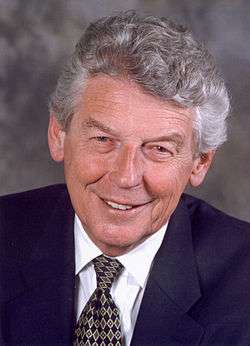Labour Party (Netherlands)
The Labour Party (Dutch: Partij van de Arbeid, [pɑrˈtɛi vɑn də ˈʔɑrbɛit], abbreviated as PvdA, [ˌpeːveːdeːˈjaː, -deːˈʔaː] or P van de A, [ˌpeː vɑn də ˈʔaː]) is a social-democratic[6] political party in the Netherlands.
Labour Party Partij van de Arbeid | |
|---|---|
 | |
| Abbreviation | PvdA |
| Leader | Lodewijk Asscher |
| Chairperson | Nelleke Vedelaar |
| Speaker of the House of Representatives | Khadija Arib |
| Leader in the Senate | Mei Li Vos |
| Leader in the House of Representatives | Lodewijk Asscher |
| Leader in the European Parliament | Paul Tang |
| Founded | 9 February 1946 |
| Merger of | CDU SDAP VDB |
| Headquarters | Partijbureau PvdA Leeghwaterplein 45, The Hague |
| Youth wing | Young Socialists |
| Think tank | Wiardi Beckman Foundation |
| Membership (2020) | |
| Ideology | Social democracy[2] Feminism[3] |
| Political position | Centre-left[4][5] |
| European affiliation | Party of European Socialists |
| International affiliation | Progressive Alliance |
| European Parliament group | Progressive Alliance of Socialists and Democrats |
| Colours | Red |
| Senate | 6 / 75
|
| House of Representatives | 9 / 150
|
| King's Commissioners | 3 / 12
|
| States-Provincial | 53 / 570
|
| Mayors | 75 / 352
|
| Municipal Councils | 706 / 7,991
|
| Water Boards | 49 / 442
|
| European Parliament | 6 / 26
|
| Website | |
| pvda | |
| |
The party was founded in 1946 as a merger of the Social Democratic Workers' Party, the Free-thinking Democratic League, and the Christian Democratic Union. Prime Ministers from the Labour Party have been Willem Drees (1948–1958), Joop den Uyl (1973–1977), and Wim Kok (1994–2002).
From 2012 to 2017, the PvdA formed the second largest parliamental faction and was the junior partner in the Second Rutte cabinet with the People's Party for Freedom and Democracy. Since 2016, Lodewijk Asscher has been Leader of the Labour Party. The party fell to only nine seats in the House of Representatives at the 2017 general election, making it only the seventh-largest faction in the chamber–its worst showing ever. However, the PvdA rebounded with a first-place finish in the 2019 European Parliament election in the Netherlands, winning 6 of 26 seats with 19% of the vote.
The Labour Party is a member of the European Party of European Socialists and the global Progressive Alliance. In the European Parliament, where the Labour Party has 6 seats, it is part of the parliamentary group Progressive Alliance of Socialists and Democrats.
History
1946–1965
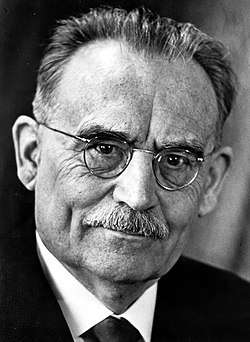
During the German Occupation of the Netherlands in the Second World War, a group of prominent Dutchmen of all democratic political ideologies were interned as hostages in St. Michielsgestel by the German occupation authorities. They came to the consensus that the pre-war fragmentation of Dutch political life, known as "Pillarization", should be overcome after the war in a so-called doorbraak. These people formed the Dutch People's Movement (NVB) immediately after the war ended in 1945. The new movement promoted the foundation of the Labour Party (Partij van de Arbeid – PvdA)) on 9 February 1946, through a merger of three pre-war parties, namely the Social Democratic Workers' Party (SDAP), the social liberal Free-thinking Democratic League (VDB) and progressive-Protestant Christian Democratic Union (CDU).[7] They were joined by individuals from Catholic resistance group Christofoor, as well as some of the more progressive members of the Protestant parties Christian Historical Union (CHU) and Anti-Revolutionary Party (ARP). The founding Congress was chaired by NVB-member Willem Banning.
The founders of the PvdA wanted to create a broad party, breaking with the historic tradition of pillarisation. The party combined socialists with liberal democrats and progressive Christians.[8] However, the party was unable to break pillarisation. Instead the new party renewed the close ties that the SDAP had with other socialist organisations (see linked organisations). In 1948, some of the left-liberal members, led by former VDB leader Pieter Oud, left the PvdA after concluding it had become too socialist for their liking. Together with the Freedom Party, they formed the People's Party for Freedom and Democracy (VVD), a conservative liberal party.
Between 1946 and 1958, the PvdA led coalition governments with the Catholic People's Party (KVP), and combinations of VVD, ARP and CHU, with the PvdA's Willem Drees as prime minister. The KVP and the PvdA together had a large majority in parliament. Under his leadership the Netherlands recovered from the war, began to build its welfare state and Indonesia became independent.
After the cabinet crisis of 1958, the PvdA was replaced by the VVD. The PvdA was in opposition until 1965. The electoral support of PvdA voters began to decline.
1965–1989
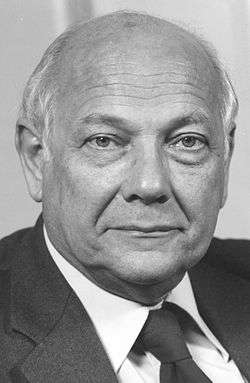
In 1965 a conflict in the KVP-ARP-CHU-VVD cabinet made continuation of the government impossible. The three confessional, Christian-influenced parties turned towards the PvdA. Together they formed the Cals cabinet, with KVP leader Jo Cals as prime minister. This cabinet was also short lived and conflict ridden. The conflicts culminated in the fall of the Cals cabinet over economic policy.
Meanwhile, a younger generation was attempting to gain control of the PvdA. A group of young PvdA members, calling themselves the New Left, changed the party. The New Left believed the party should become oriented towards the new social movements, adopting their anti-parliamentary strategies and their issues, such as women's liberation, environmental conservation and Third World development. Prominent New Left members were Jan Nagel, André van der Louw and Bram Peper. One of their early victories followed the fall of the Cals cabinet. The party Congress adopted a motion that made it impossible for the PvdA to govern with the KVP and its Protestant allies. In response to the growing power of the New Left group, a group of older, centrist party members, led by Willem Drees' son, Willem Drees, Jr. founded the New Right. They split in 1970, after it was clear that they had lost the conflict with the New Left, and founded a new moderate Social Democratic party, Democratic Socialists '70 (DS70).
Under the New Left, the PvdA started a strategy of polarisation, striving for a cabinet based on a progressive majority in parliament. In order to form that cabinet the PvdA allied itself with the social liberal party Democrats 66 (D66) and the progressive Christian Political Party of Radicals (PPR). The alliance was called the Progressive Accord (PAK). In the 1971 and 1972 elections, these three parties promised to form a cabinet with a radical common programme after the elections. They were unable to gain a majority in either election. In 1971, they were kept out of cabinet, and the party of former PvdA members, DS70, became a partner of the First Biesheuvel cabinet.
In the 1972 elections, neither the PvdA and its allies or the KVP and its allies were able to gain a majority. The two sides were forced to work together. Joop den Uyl, the leader of the PvdA, led the cabinet. The cabinet was an extra-parliamentary cabinet and it was composed of members of the three progressive parties and members of the KVP and the ARP. The cabinet attempted to radically reform government, society and the economy, and a wide range of progressive social reforms were enacted during its time in office, such as significant increases in welfare payments and the indexation of benefits and the minimum wage to the cost of living.[9]
The PvdA also faced economic decline and was riddled with personal and ideological conflicts. Especially, the relationship between Prime Minister Den Uyl and the KVP Deputy Prime Minister, Van Agt was very problematic. The conflict culminated just before the 1977 elections, the cabinet fell. The 1977 general election were won by the PvdA, but the ideological and personal conflict between Van Agt and Den Uyl prevented the formation of a new centre-left cabinet. After very long cabinet formation talks, the Christian Democratic Appeal (CDA), itself a new Christian democratic political formation composed of KVP, CHU and ARP, formed government with the VVD, based on a very narrow majority. The PvdA was left in opposition.
In the 1981 general election, the incumbent CDA-VVD cabinet lost their majority. The CDA remained the largest party, but it was forced to co-operate with the PvdA and D66 (the PPR had left the alliance, after losing the 1977 elections). In the new cabinet led by Van Agt, Den Uyl returned to cabinet, now as Deputy Prime Minister. The personal and ideological conflict between Van Agt and Den Uyl culminated in the fall of the cabinet just months after it was formed. The VVD and the CDA regained their majority in the 1982 general election and retained it in the 1986 general election. The PvdA was left in opposition. During this period, the party began to reform. In 1986, Den Uyl left politics, appointing former trade union leader Wim Kok as his successor.
1989–2010
After the 1989 general election, the PvdA returned to cabinet together with the CDA. Kok became Deputy Prime Minister to CDA leader Ruud Lubbers. The PvdA accepted the major economic reforms the previous Lubbers cabinets made, including privatisation of public enterprises and reform of the welfare state. They continued these policies in this cabinet. The cabinet faced heavy protest from the unions and saw major political conflict within the PvdA itself.
In the 1994 general election, the PvdA and CDA coalition lost its majority in parliament. The PvdA, however, emerged as the biggest party. Kok formed a government together with the conservative liberal VVD and social liberal D66. The so-called purple government was a political novelty, because it was the first since 1918 without any ministers from the CDA or its predecessors. The First Kok cabinet continued the Lubbers-era economic reforms, but combined this with a progressive outlook on ethical questions and promises of political reform. Kok became a very popular Prime Minister; he was not a partisan figure but combined successful technocratic policies with the charisma of a national leader. In the 1998 general election, the cabinet was rewarded for its stewardship of the economy. The PvdA and the VVD increased their seats, at the cost of D66; the Second Kok cabinet was formed.
The PvdA was expected to perform very well in the 2002 general election. Kok left politics leaving the leadership of the party to his preferred successor Ad Melkert. But the political rise of Pim Fortuyn frustrated these hopes. The PvdA lost the 2002 elections, and the party's parliamentary representation fell from 45 seats to 23. The loss was blamed on the uncharismatic new leader Melkert, the perceived arrogance of the PvdA and the inability to answer to the right-wing populist issues Fortuyn raised, especially immigration and integration. Melkert resigned as party leader and was replaced by Jeltje van Nieuwenhoven. The PvdA was kept out of cabinet. The government formed by CDA, VVD and the Pim Fortuyn List (LPF) fell after a very short period.
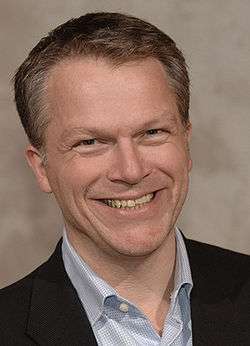
Meanwhile, Wouter Bos, Undersecretary in the second purple cabinet, was elected leader of the PvdA in a referendum among PvdA members, being elected closely to Jouke de Vries. He started to democratise the party organisation and began an ideological reorientation. In the 2003 general election, Wouter Bos managed to regain almost all seats lost in the previous election, and the PvdA was once again the second largest party in the Netherlands, only slightly smaller than the CDA. Personal and ideological conflicts between Bos and the CDA leader Jan Peter Balkenende prevented the formation of a CDA-PvdA cabinet. Instead, the PvdA was kept out of government by the formation of cabinet of the CDA, the VVD, and D66, the latter being former allies of PvdA. In the 2006 municipal elections, the renewed PvdA performed very well. The PvdA became by far the largest party nationally, while the three governing parties lost a considerable number of seats in municipal councils.
PvdA party lost the race for Prime Minister to the CDA after suffering a loss of 9 seats in the 2006 general election. The PvdA now held only 33 seats, losing many votes to the Socialist Party (SP). The PvdA had previously distanced themselves from the idea of a voting bloc on the left. It did, however, join the fourth Balkenende cabinet on 22 February 2007, in which Wouter Bos became minister of Finance. In the aftermath of the lost elections, the entire party executive stepped down on 26 April 2007. On Saturday 20 February 2010, the Labour Party withdrew from the government after arguments over the Dutch role in Afghanistan.
2010–present
After withdrawing from the government, Wouter Bos announced he would leave politics to spend more time with his wife and two daughters. Then mayor of Amsterdam, Job Cohen, took his place as leader of the PvdA. In the 2010 election, the PvdA won 30 seats, a loss of three, and were narrowly overtaken by the VVD. After the election, a "Purple Coalition" was considered – it would have required a fourth party in addition to the VVD, PvdA and D66 – but talks broke down and the PvdA entered opposition.
.jpg)
Cohen resigned as leader in February 2012.[10] Diederik Samsom was subsequently elected the party leader. In the 2012 general election, the Labour Party won 38 seats, a gain of 8, defying initial predictions that the Socialist Party would overtake them. Following the election the party entered a governing coalition with the VVD under Mark Rutte, with Labour's Lodewijk Asscher becoming Deputy Prime Minister.
Opinion polls suggested that popular support for the PvdA fell into a gradual decline in the years after the 2012 election. The party was polled as low as 5% by Peil on 8 May 2016.[11][12] In December 2016 Samson was defeated by Lodewijk Asscher in a party leadership election.
In the Dutch general election of 2017, the PvdA suffered the biggest defeat in Dutch electoral history, receiving only 5.7% of the votes and losing 29 of its 38 seats. Asscher did not resign from his post, claiming the defeat was his predecessor's responsibility. The party experienced a degree of revival in 2019, obtaining the most votes in that year's European Parliament election. This marked the first time the PvdA has finished on top in a national election since 1998.
Ideology
The PvdA began as a traditional social-democratic party, committed to building a welfare state. During the 1970s, it radicalised its programme and included new issues such as environmental conservation, Third World development and women's liberation. During the 1990s, it moderated its programme to include Third Way economic and social positions, including reform of the welfare state and privatisation of public enterprise. In 2005, the party adopted a new programme of principles, expressing a centre-left ideology. Its core issues are employment, social security and welfare as well as and investing in public education, health care and public safety.
Electorate
Historically, the PvdA was supported by the working class. Currently, the party is supported relatively well by civil servants, migrants and the elder working class. The party has historically been very strong in the major cities such as Amsterdam and Rotterdam as well as in the northern provinces of Drenthe, Friesland and Groningen.
Organisation
Leadership
|
|
|
|
Organisational structure
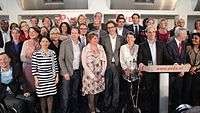
The highest organ of the PvdA is the Congress, formed by delegates from the municipal branches. It convenes once every year. It appoints the party board, decides the order of candidates on electoral lists for the Senate, House of Representatives and European Parliament and has the final say over the party programme. Since 2002, a referendum of all members has partially replaced the Congress. Both the lijsttrekker of the House of Representatives candidate list, who is the political leader of the party, and the party chairman, who leads the party organisation, are selected by such a referendum. In 2002, Wouter Bos won the PvdA leadership election.
Members
As of 2020, PvdA has 42,794 members.[1] They are organised in over 500 municipal branches.
Linked organisations
Rood is the party periodical. It appears eight times a year. The Young Socialists is the youth organisation of the PvdA. It is a member of Young European Socialists and the International Union of Socialist Youth. They publish the periodical Lava.
The scientific institute (or think tank) of the PvdA is the Wiardi Beckman Foundation. It publishes the periodical Socialisme & Democratie. The PvdA participates in the Netherlands Institute for Multiparty Democracy, a democracy assistance organisation of seven Dutch political parties.
International organisations
The PvdA is a full member of the Party of European Socialists and was formerly an observer member of the Socialist International until December 2014, having previously downgraded their membership in December 2012.[13] The PvdA joined the Progressive Alliance, a new international network for social democratic political parties, at its founding event on 22 May 2013.[14]
Pillarised organisations
During the period of strong pillarisation the PvdA had strong links with the social democratic broadcasting organisation VARA Broadcasting Association, the Dutch Association of Trade Unions, and the paper Het Vrije Volk.
Relationships to other parties
Historically, the PvdA has co-operated in cabinets with the Christian democratic Christian Democratic Appeal (CDA), Political Party of Radicals (PPR), Catholic People's Party (KVP), Anti-Revolutionary Party (ARP), Christian Historical Union (CHU) and ChristianUnion (CU) parties and the liberal parties Democrats 66 (D66) and People's Party for Freedom and Democracy (VVD). Between 1971 and 1977, PvdA was allied with D66 and the PPR. After 1977 until 1989, it was closely allied to D66. Since 2003, the relationship between the PvdA and D66 has considerably worsened, at first because PvdA was in opposition to the second Balkenende cabinet which D66 had co-operated in.
During the governance of the second and third Balkenende cabinet, the Socialist Party and GreenLeft were calling for closer cooperation with the PvdA, calling to form a shadow government against the Balkenende cabinet, PvdA leader Bos held this off.
Electoral results
House of Representatives
.jpg)
| Election year | No. of votes | % of overall vote | No. of seats won | Change | Government |
|---|---|---|---|---|---|
| 1946 | 1,347,940[15] | 28.31%[15] | 29 / 100 |
In coalition | |
| 1948 | 1,262,888[15] | 25.61%[15] | 27 / 100 |
In coalition (1948–1951) | |
| In coalition (1951–1952) | |||||
| 1952 | 1,545,844[15] | 28.97%[15] | 30 / 100 |
In coalition | |
| 1956 | 1,872,201[15] | 32.69%[15] | 50 / 150 |
In coalition (1956–1958) | |
| In opposition (1958–1959) | |||||
| 1959 | 1,821,285[15] | 30.36%[15] | 48 / 150 |
In opposition | |
| 1963 | 1,753,025[15] | 28.01%[15] | 43 / 150 |
In opposition (1963–1965) | |
| In coalition (1965–1966) | |||||
| In opposition (1966–1967) | |||||
| 1967 | 1,620,447[15] | 23.55%[15] | 37 / 150 |
In opposition | |
| 1971 | 1,554,733[15] | 24.60%[15] | 39 / 150 |
In opposition | |
| 1972 | 2,021,454[15] | 27.34%[15] | 43 / 150 |
In coalition | |
| 1977 | 2,813,793[15] | 33,83%[15] | 53 / 150 |
In opposition | |
| 1981 | 2,458,452[15] | 28.29%[15] | 44 / 150 |
In coalition | |
| 1982 | 2,503,517[15] | 30.40%[15] | 47 / 150 |
In opposition | |
| 1986 | 3,051,678[15] | 33.23%[15] | 52 / 150 |
In opposition | |
| 1989 | 2,832,739[15] | 31.91%[15] | 49 / 150 |
In coalition | |
| 1994 | 2,153,135[15] | 23.97%[15] | 37 / 150 |
In coalition | |
| 1998 | 2,494,555[15] | 28.98%[15] | 45 / 150 |
In coalition | |
| 2002 | 1,436,023[15] | 15.11%[15] | 23 / 150 |
In opposition | |
| 2003 | 2,631,363[15] | 27.26%[15] | 42 / 150 |
In opposition | |
| 2006 | 2,085,077[15] | 21.19%[15] | 33 / 150 |
In coalition (2006–2010) | |
| In opposition (2010) | |||||
| 2010 | 1,848,805[15] | 19.63%[15] | 30 / 150 |
In opposition | |
| 2012 | 2,340,750[15] | 24.84%[15] | 38 / 150 |
In coalition | |
| 2017 | 599,699[16] | 5.7%[16] | 9 / 150 |
In opposition |
Senate
.jpg)
| Election year | No. of votes | % of overall vote | No. of seats won | Change |
|---|---|---|---|---|
| 2003 | 40,613[17] | 25.12%[17] | 19 / 75 |
|
| 2007 | 31,032[17] | 19.03%[17] | 14 / 75 |
|
| 2011 | 106[17] | 18.76%[17] | 14 / 75 |
|
| 2015 | 63[17] | 11.05%[17] | 8 / 75 |
European Parliament
.jpg)
| Election year | List | No. of votes | % of overall vote | No. of seats won | Change | Notes |
|---|---|---|---|---|---|---|
| 1979 | List | 1,722,240 | 30.39% (2nd) | 9 / 25 |
[18] | |
| 1984 | List | 1,785,165 | 33.70% (1st) | 9 / 25 |
0 |
[19] |
| 1989 | List | 1,609,626 | 30.70% (2nd) | 8 / 25 |
1 |
[20] |
| 1994 | List | 945,869 | 22.88% (2nd) | 8 / 31 |
0 |
[21] |
| 1999 | List | 712,929 | 20.11% (2nd) | 6 / 31 |
2 |
[22] |
| 2004 | List | 1,124,549 | 23.60% (2nd) | 7 / 27 |
1 |
[23] |
| 2009 | List | 548,691 | 12.05% (3rd) | 3 / 25 |
4 |
[24] |
| 2014 | List | 446,763 | 9.40% (6th) | 3 / 26 |
0 |
[25] |
| 2019 | List | 1,045,274 | 19.01% (1st) | 6 / 26 |
3 |
[26] |
Representation
Members of the House of Representatives
The nine members (five men, four women) of the House of Representatives for the Labour Party are the following:[27]
Members of the Senate
The eight members (four men, four women) of the Senate for the Labour Party are the following:[28]
- Esther-Mirjam Sent, parliamentary leader
- Jannette Beuving
- Jopie Nooren
- Mohamed Sini
- André Postema
- Lambert Verheijen
- Janny Vlietstra
- Wouter van Zandbrink
Members of the European Parliament
The six members (four women, two men) of the European Parliament since the European Parliamentary election of 2019 are the following:
References
- "Forum voor Democratie qua ledental de grootste partij van Nederland" (PDF). Documentatiecentrum Nederlandse Politieke Partijen (in Dutch). Retrieved 27 January 2020.
- Nordsieck, Wolfram (2017). "Netherlands". Parties and Elections in Europe. Retrieved 4 August 2018.
- "Man/vrouw, jong/oud, afkomst: waarop selecteren partijen hun kandidaten?". nos.nl (in Dutch). Retrieved 27 June 2020.
- Josep M. Colomer (24 July 2008). Comparative European Politics. Taylor & Francis. p. 221f. ISBN 978-0-203-94609-1. Retrieved 13 July 2013.
- Score 4.0/10 in 2003 Chapel Hill expert survey, see Hooghe et al. (2003) Chapel Hill Survey Archived 25 July 2008 at the Wayback Machine
- The PvdA is widely described as a social democratic political party:
- Andeweg, R. B.; Galen A. Irwin (2002). Governance and politics of the Netherlands. Basingstoke: Palgrave Macmillan. p. 51. ISBN 978-0-333-96157-5.
- Merkel, Wolfgang; Alexander Petring; Christian Henkes; Christoph Egle (2008). Social Democracy in Power: the capacity to reform. London: Taylor & Francis. ISBN 978-0-415-43820-9.
- Rudy W Andeweg; Lieven De Winter; Patrick Dumont (5 April 2011). Government Formation. Taylor & Francis. p. 147. ISBN 978-1-134-23972-6. Retrieved 20 August 2012.
- Ricky Van Oers; Eva Ersbøll; Dora Kostakopoulou; Theodora Kostakopoulou (30 June 2010). A Re-Definition of Belonging?: Language and Integration Tests in Europe. BRILL. p. 60. ISBN 978-90-04-17506-8. Retrieved 20 August 2012.
- Barbara Wejnert (26 July 2010). Democratic Paths and Trends. Emerald Group Publishing. p. 28. ISBN 978-0-85724-091-0. Retrieved 20 August 2012.
- Dimitri Almeida (27 April 2012). The Impact of European Integration on Political Parties: Beyond the Permissive Consensus. CRC Press. p. 71. ISBN 978-1-136-34039-0. Retrieved 14 July 2013.
- Gebhard Moldenhauer (1 January 2001). Die Niederlande und Deutschland: einander kennen und verstehen. Waxmann Verlag. p. 113. ISBN 978-3-89325-747-8.
- Ton Notermans (January 2001). Social Democracy and Monetary Union. Berghahn Books. p. 226. ISBN 978-1-57181-806-5.
- Ferrera, Maurizio; Rhodes, Martin (1 January 2000). Recasting European Welfare States. Psychology Press. ISBN 9780714651040 – via Google Books.
- "Dutch Labour Party leader resigns". RNW Media. Archived from the original on 8 August 2014. Retrieved 8 June 2015.
- "Archived copy" (PDF). Archived (PDF) from the original on 12 May 2017. Retrieved 10 May 2016.CS1 maint: archived copy as title (link)
- "Tijd voor een revolutie in de politiek: gros burgemeesters heeft niets met het volk". 9 May 2016. Archived from the original on 10 May 2016.
- "PvdA steunt oprichting Progressive Alliance". PvdA – Partij van de Arbeid. Archived from the original on 24 September 2015. Retrieved 8 June 2015.
- "Progressive Alliance opgericht in Leipzig – PvdA". pvda.nl. 24 May 2013. Archived from the original on 24 December 2013.
- "Verkiezingsuitslagen Tweede Kamer 1918 – heden Archived 18 July 2011 at the Wayback Machine" (in Dutch), Kiesraad. Retrieved 24 March 2017.
- "Uitslag van de verkiezing van de leden van de Tweede Kamer van 15 maart 2017 – Kerngegevens Archived 22 March 2017 at the Wayback Machine" (in Dutch), Kiesraad, 2017. Retrieved 24 March 2017.
- "Verkiezingsuitslagen Eerste Kamer 1918 – heden Archived 4 March 2016 at the Wayback Machine" (in Dutch), Kiesraad. Retrieved 24 March 2017.
- "Kiesraad: Europees Parlement 7 juni 1979" (in Dutch). Kiesraad. Retrieved 19 June 2019.
- "Kiesraad: Europees Parlement 14 juni 1984" (in Dutch). Kiesraad. Retrieved 19 June 2019.
- "Kiesraad: Europees Parlement 15 juni 1989" (in Dutch). Kiesraad. Retrieved 19 June 2019.
- "Kiesraad: Europees Parlement 9 juni 1994" (in Dutch). Kiesraad. Retrieved 19 June 2019.
- "Kiesraad: Europees Parlement 10 juni 1999" (in Dutch). Kiesraad. Retrieved 19 June 2019.
- "Kiesraad: Europees Parlement 10 juni 2004" (in Dutch). Kiesraad. Retrieved 19 June 2019.
- "Kiesraad: Europees Parlement 4 juni 2009" (in Dutch). Kiesraad. Retrieved 19 June 2019.
- "Kiesraad: Europees Parlement 22 mei 2014" (in Dutch). Kiesraad. Retrieved 19 June 2019.
- "Kiesraad: Europees Parlement 23 mei 2019" (in Dutch). Kiesraad. 4 June 2019. Retrieved 19 June 2019.
- "Labour party Archived 25 March 2017 at the Wayback Machine", House of Representatives. Retrieved 24 March 2017.
- "PvdA-fractie Archived 28 January 2017 at the Wayback Machine" (in Dutch), Senate. Retrieved 28 February 2018.
Further reading
- Orlow, Dietrich. Common Destiny: A Comparative History of the Dutch, French, and German Social Democratic Parties, 1945–1969 (2000) online
External links
| Wikimedia Commons has media related to Partij van de Arbeid. |
- Official website

- PvdA archives at the International Institute of Social History: Objectencollectie * Archief
